🦋 Perspective Shifts and New Questions
Looking Back: 15 Highlights, 5 Perspective Shifts, 47 Books, 12 Questions, and Looking Ahead (plus, Instructions on Not Giving Up)
🌞 5 Personal highlights and big life/world events that shaped my year
I moved from Paris to Marseille and bought a flat. Hello, Mediterranean sun and sea!
I did my first solo hiking trip en itinérance in the Queyras this summer - new feelings of freedom.
I had a scary health incident that landed me in the emergency room in May - a reminder that health comes first.
War broke out in the Middle East while it continues in Ukraine, and all sorts of other tensions and conflicts are in full force around the world, making it hard to be hopeful sometimes, but strengthening even further my resolve to act for a better future. It’s raised a lot of questions about identity, borders, and citizenship to the fore of my reflections.
AI and LLMs broke out into the mainstream this year, changing how I work and shaping conversations about its implications for governance, politics, the economy, and many other things.


Solo on top of the ridge after an early climb up / Les Calanques New Year's Day
🚀 10 DemocracyNext Highlights
I worked with my wonderful DemNext team and collaborators during our first full year of operations! We grew to a team of 5; a highlight for me was our awesome retreat in the Alps this summer.
We published our flagship Assembling an Assembly Guide.
We launched our International Task Force on Democratising City Planning, and have worked with around 200 international, multi-disciplinary stakeholders to shape a set of proposals that we’ll launch in February.
We co-launched the Tech-Enhanced Citizens’ Assemblies Pop-Up Lab with MIT Center for Constructive Communication (MIT CCC) - we’re piloting a first set of ideas at the MIT Student Assembly taking place in two weeks.
We collaborated with Design & Democracy, Nexus Institute, the Bundestkunsthalle and SKD Dresden on two groundbreaking Citizens’ Assemblies on Democratising the Museum. A first exhibit at the Bundeskunsthalle on Redesigning Democracy is opening in May.
We co-published a paper with the European University Institute with ambitious proposals for a permanent and empowered EU Citizens’ Assembly as the EU’s Fourth Pillar of Government. The EU Commission’s Defence of Democracy package has references to Citizens’ Assemblies and Panels; we are urging them to be a step more ambitious in their impact and influence.
I met former President Obama in Athens, spoke with him about Citizens’ Assemblies, and met an amazing group of humans in the Obama Leaders program.
I got to have some thought-provoking conversations about our work with: Baratunde Thurston, Alice Rawsthorn, Hilary Sutcliffe, Markus Miessen and César Reyes, and Larry Lessig (podcast coming soon).
Besides the papers mentioned, I wrote a few other essays and articles that helped me evolve my ideas: Assembly Required (RSA); A tree, a roof, a tent: Spatial models for a new democratic paradigm (co-authored chapter with Amelie Klein and Vera Sacchetti in Markus Miessen’s book Agonistic Assemblies), and More-than-human democracy (personal Substack).
I spoke at many events - from big public town halls, to innovation festivals, meetings at international organisations like the EU and UN, academic conferences, creative workshops, community gatherings, and more - where I met many inspiring people who give me hope. In Bend, Oregon, to Seattle, San Francisco, LA, DC, New York, Cambridge, MA, Copenhagen, The Hague, London, Paris, Brussels, and elsewhere. My colleagues were also all over the world - in Mexico, Rio, Bogota, Vienna, Vilnius, Warsaw. And we connected at virtual events with collaborators in India, South Africa, Japan, and New Zealand. There are aspects of working internationally and remotely that can be a little difficult sometimes, but the richness of diversity and human connection across the globe is a big part of this work that I love.

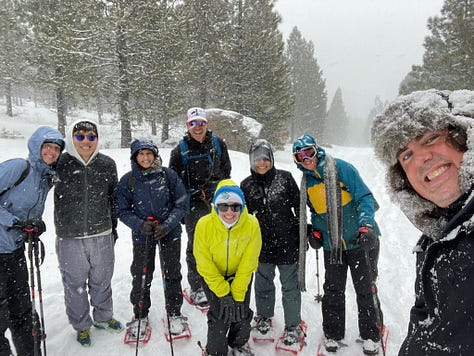
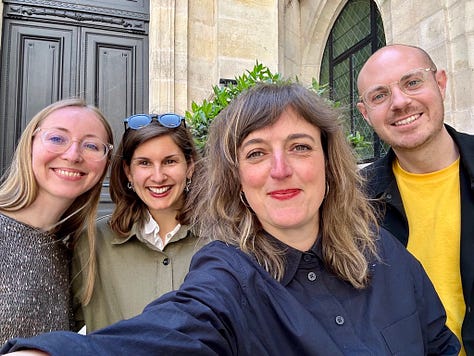
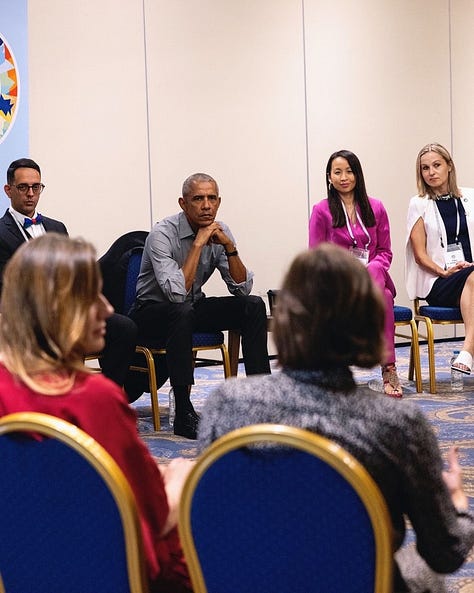
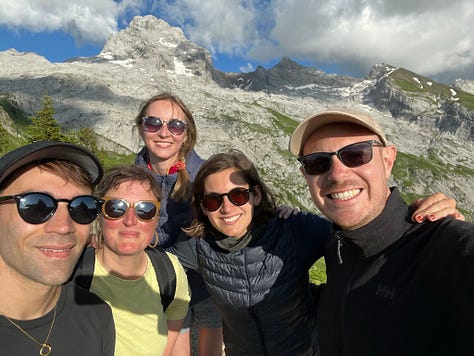

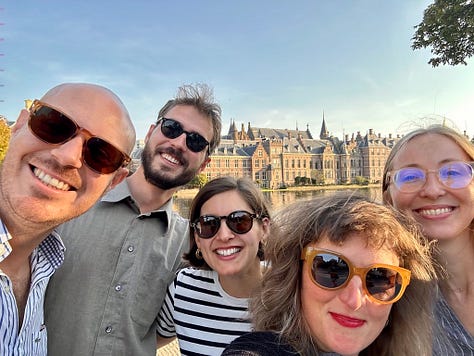


Aarhus / Oregon / Paris / Athens / Alps / Linz / The Hague / New York / Copenhagen
💭 5 Perspective Shifts
🌿 1. Beyond the paradigm of ‘democracy’
Until now, I would say that I’ve mostly been convinced that we need to ‘renew’, ‘reimagine’, and ‘redesign’ democracy, or even ‘reclaim’ it, bringing back to the fore ancient wisdoms that have been brushed aside these past couple centuries. I’m no longer so sure.
I don’t think we can 'save' democracy when it has become a term rendered meaningless with adjectives like ‘illiberal democracy’ becoming ever more common on the one hand, and great numbers of people being entirely disillusioned with the idea altogether. Democracy has become intertwined with elections, political parties, campaigns, and debates. Threatened by growing authoritarianism, I can understand why many are fighting to ‘save’ or ‘renew’ democracy. But like many others, I don't find it inspiring to try and save the status quo.
That doesn’t mean that we need to give in to authoritarianism either, throw the baby out with the bathwater, or retreat into apathetic bubbles. I don’t believe in revolution from one day to another, and there are aspects of current governance models that are good. But it does feel like we’re at a seismic tipping point for larger scale change.
We need a compelling, hopeful, and possible alternative to democracy. I don’t know what we call it yet; it needs a name. I don’t think it’s just a new adjective placed before ‘democracy’.
We need new processes, rituals, cultures, institutions, and spaces. I believe that these need to centre deliberation, creating the epistemic conditions that enable us to be with the complexity of the issues we face, that channel our collective wisdom, and that help us find common ground. Ones that maximise the constructive side of humanity. Ones that ignite our joy and open our hearts to be capacious.
I also believe that we need to anchor this alternative in a more relational, more-than-human worldview. One that acknowledges that nature is not something separate to us. We are part of the natural world and are living in relationship with everything in it. The new wave of AI technology is also changing our relationships - with it as well as with one another. How do we live more harmoniously with one another, with our planet, and with AI? These questions link up to my next two points.
🦋 2. More-than-human governance
By emphasising the more-than-human, I’m referring to the aspect of our relationship to place that is not just about city or country, but about our relationship with the living world. This might seem far away from the top concerns of today when we're talking about war and so on. As Kerri ni Dochartaigh has written in Thin Places, talking about her experience of growing up in Derry during the Troubles:
“when whole streets are burned down, and the fact of a city changed beyond recognition, very few folks notice their disconnect with the natural world. When you’ve no home to go to because it’s been petrol bombed, seeking the wonder of the wild world is not a priority.”
But, she also goes on to articulate precisely why reconnecting with the natural world can be so healing and so powerful:
“There is so much life in the places around us and, sometimes, for some of us, somehow, this helps us to value our own life… Battles, governments, laws, leaders - borders - come and go, but the land and its sacred places remain unmoved and unchanged in their core.”
A disconnection from the natural world is one part of why many people feel disconnected from each other, feeling alone and depressed and powerless. These are precisely the emotions that autocrats feed upon, enflaming them to entrench divides and to gain their own strength.
It’s been a few years that I’ve been exploring themes to do with our relationship with the natural world, embodiment, language, perception, emotions, time, and other related themes. This has been part of a wider general curiosity about understanding the world and the universe and our place in it. I’d say that thus far this has somehow stayed separate from my ‘work’ on democratic innovation, which has remained very human-focused, and perhaps narrowly focused on processes and institutions.
I’m starting to see some clearer threads and connections between the human and the more-than-human (a term coined by David Abram; The Spell of the Sensuous is probably the book that has had the biggest shift on my thinking in the past decade). I wrote a first essay exploring some of these ideas here. I’ve also been following with interest the work of Dark Matter Labs, Berggruen Institute, and others on these issues too. There is a growing movement of people and organisations who are working to give legal rights and political representation to non-human animals, species and plants. We’ll be doing a small exploratory project at DemocracyNext on these themes with Arising Quo, focusing on Europe as a starting point over the next few months. I’m excited to see how this develops, and I’d like to grow this aspect of our work.
🎙️ 3. Leveraging tech for deliberation, sortition (selecting decision makers by lottery), and governance experiments
It feels like it would have been impossible to not mention tech in a post reflecting on this year. As someone who has always emphasised the benefit and needs for in-person, I’ve been sceptical about a lot of the ‘tech for deliberation and participation’ experiments over the past few years. Many of them are certainly well-intentioned, with people wanting to find ways to give people a voice or to involve more people in ideation or decision making. Yet many of them, in my view, also miss the point about what is the problem that we need to be solving.
To simplify, as I’m not going to go into an analysis of this in the middle of a reflection post, I see the deep currents of the problems we’re facing to do with issues of many people lacking a sense of agency, dignity, belonging, and trust, as well as an inability of our current systems to handle the complexity of the issues that we face. This means that the ‘solutions’ for addressing these problems are not simple or easy. They require creating the processes and spaces for us to be with the complexity of the issues, to see and hear one another and be seen and heard, and to put ourselves in others’ shoes. There is no shortcut to achieving these goals; it takes time. These things don’t magically happen on their own either; it requires some form of structured process that enables people to do them.
Tech cannot be the lead; it needs to play the supporting role. It can be an enabler, that helps humans to listen to one another better, to share their stories, to help them make sense of information together, and to encourage transparency and trustworthiness.
I still see a lot of tech initiatives in this space that have goals of ‘efficiency’ or ‘scalability’ for the sake of it. I have also been sceptical about many (most) of the AI companies’ attempts to legitimise their lack of genuine democratic governance with “democracy” experiments. Many people want to find ways of replacing the need to do things in person by virtual equivalencies. On planetary scale issues, this may be desirable to some extent. For local community matters, I remain to be convinced how tech that eliminates a need for people to see each other and spend time together is actually helping address the deep roots of the problems we face in terms of agency, dignity, belonging, trust, and complexity. I recognise though that not everyone shares my analysis of the problems.
But this year I’ve encountered a growing number of people and initiatives that have a different set of values and worldview when it comes to tech’s role. Many of them have been working for many years already and our disparate bubbles have thankfully collided. I’m excited by the collaboration we’ve established with MIT CCC on Tech-Enhanced Citizens’ Assemblies. Deb Roy, Dimitra Dimitrakopoulou, and their colleagues and students have been doing incredible work building technology to work at the ‘speed of trust’, rooted in ancient wisdoms, such as deliberation.
There is also a growing number of scholars working at the intersection of computer science and political science, at the intersection of academia and practice, to develop better sortition methods and more sophisticated analysis about deliberation quality and other metrics of interest to the field, such as Ariel Procaccia, Bailey Flanigan, Paul Goelz, MASS LBP, Healthy Democracy, newDemocracy Foundation, Sortition Foundation, and others. This feels like early days in what will hopefully be a growing interdisciplinary set of collaborations leading to new innovations in practice.
The advancements in generative AI are also opening up new avenues of experimentation and research for governing AI and governing with AI - two interrelated themes that we’ll be exploring at a conference organised by Hélène Landemore at Yale in February.
There is also an emerging number of ways that we should be able to experiment with AI-augmented Collective Intelligence (ACI), as Gianni Giacomelli has been writing about and testing.
I’m looking forward to reading Nathan Schneider’s forthcoming book on Governable Spaces: Democratic Design for Online Life. And have also been inspired by the work that New_Public is doing to reimagine online public spaces.
🏛️ 4. Connecting the systemic and the spatial
I recognise I’m far from the first person to entertain the connections between space and politics. Yet the work that we’ve been doing on democratising city planning at DemNext, in collaboration with a Task Force with a mix of architects, planners, investors, urbanists, governance experts, and others, has brought to light how so often the connections between the systemic and the spatial infrastructure for flourishing civic life is simply missing.
The inclusive and welcoming spaces to gather for communal meals, deliberation, exhibitions, sports, art, and other community activities does not always exist, and if it does it is rarely governed by the community itself. Like Spor10 and Demokrati Garage in Copenhagen, or Civic Square in Birmingham. Combined with the ‘connecting’ institutions that play a role in pushing governance experimentation, such as Arantzazulab in the Basque Country - a democracy innovation lab collaboratively governed by a mix of public, private, civic, and academic institutions across the region.
If the systemic change is to happen, it needs to be accompanied by physical spaces that enable people to come together in new ways. Another thread of this is related to the spaces of government itself. Earlier this year, with Vera Sacchetti and Amelie Klein, we wrote a chapter for Markus Miessen’s new book exploring spatial models for a new democratic paradigm, and my colleagues James MacDonald-Nelson and Gustav Kjaer-Nielsen have been writing a series of papers exploring the physical spaces needed to create enabling conditions for quality deliberation (first one forthcoming in Feb/March). We are exploring some avenues to bring to life these ideas both in grander ways through public installations, as well as by incorporating the principles into the assemblies that we’re involved in designing.
This feels like the start of an exploration. I’d like to learn more about the examples mentioned here, as well as relevant others, to understand what enabling factors allowed these spaces to emerge and thrive, what challenges they faced, and how they can be sustainable.
🌍 5. Identity, citizenship, borders, land, time, and relationality with the living world
People have been debating these issues for a long time. Yet the nature of those debates hasn’t always been the same. In his new book on identity, The Lies that Bind, Kwame Anthony Appiah reflects on how affiliations and dividing lines based on gender, religion, race, nationality, class, and culture have evolved historically and contextually. He doesn’t comment on why these divisions have exploded to the fore of political debates in recent times, rather leaving the reader to their own reflections.
Even though I have been working on democratic innovation for over a decade now, I realised this year that I had not spent much time seriously thinking about any of these issues before. Much about them I had taken for granted. We are shaped by the norms and the social constructions that we grow up with. To some extent, these issues have always been present in the back-of-my-mind sort of way. I was born to Polish parents in Canada, which has been reckoning with its own relationships and history with indigenous populations for the past few decades. I lived in the UK during the Scottish independence and Brexit referendums. I’ve been in Europe during the migration and refugee debates of the past 15 years.
But I’ve thought more about these issues, the language we use to talk about them, and my own position on them more this past year than I ever have before. It’s also been a process over the past few years to start making the connections between questions of identity, citizenship, and borders, and how they are related to our relationship with the land and with the wild earth as well. Somehow my inquiries into the political questions and my love of nature were sitting in two separate gardens in my mind.
Yet where and how we decide to draw borders, and how we decide who gets to belong or not shapes our relationships not just with each other, but also with the natural world. And at the same time, the natural world reminds us how ridiculous our human constructions are - especially when they lead us to violence and pain. Kerri ni Dochartaigh’s Thin Places is one of the most profoundly touching and eye-opening books I’ve read in a while - weaving her personal story of overcoming depression and suicidal thoughts, as well as the stories of deaths and tragedies of those around her, the renewed divisions and violence after the constitutional crisis of Brexit, and the stories about the ways in which the wild seas and paths and creatures along its way have been sources of healing and connection.
These questions have shown up for me in thinking about what a post-democratic paradigm looks like and entails. Once you begin to unpick a core part of the existing system, many other parts of it start to fall apart. My work on Citizens’ Assemblies has already been throwing this up in a way, where typically residents of a place - not necessarily limited to ‘official’ citizens - are eligible to be Assembly Members. If Citizens’ Assemblies were to become decision making bodies, what does this imply for political and civic representation and rights, and our notions of citizenship altogether? Citizens’ Assemblies have also been bringing to the fore the problems with the divisions of powers at different levels of government as constituted today - sometimes needing multiple jurisdictions to work together as an issue concerns them all and demands them to work together. The questions of who “we” are in a group, and who gets to define and decide on the contours of the “we” are at the heart of these dilemmas.
In the context of my work on sortition, I have also been asking myself new questions over these past few months that have touched on ideas I’ve held at the core of my work and beliefs. About the boundaries of who is eligible to be selected as an Assembly Member. On the basis of which criteria. Typically, there is some form of stratification done based on criteria such as gender, age, geography, and socio-economic status. Yet, reading Appiah’s book I was asking myself if this truly makes sense, and if this is really a democratic way of constituting a group, and if it is not yet another form of perpetuating divisions, even if being done with good intentions. Conversations with Glen Weyl (who is doing interesting work at RadicalxChange and Plurality Institute) have prompted me to reflect more deeply about maximising for political equality versus maximising for diversity. I think this is an area that merits some greater conversation and experimentation with new methodologies for selection by sortition.
📚 47 Books
The 5 most thought-provoking books I read this year
Thin Places: A Natural History of Healing and Home by Kerri ni Dochartaigh
The Lies That Bind: Rethinking Identity by Kwame Anthony Appiah
Anaximander and the Birth of Science by Carlo Rovelli
Underland: A Deep Time Journey by Robert Macfarlane
The Collective Spark: Igniting thinking in groups, teams and the wider world, edited by Martin Ringer, Rob Gordon, and Bert Vandenbussche
My recent piece on more-than-human democracy includes references to the following books
Mountains of the Mind by Robert Macfarlane
Landlines by Raynor Winn
The Extended Mind by Annie Murphy Paul
The Living Mountain by Nan Shepherd
A Philosophy of Walking by Frédéric Gros
Citizens by Jon Alexander
Other books I read this year
Non-fiction
Walking in Wonder by John O’Donohue
Enchantment by Katherine May
The Old Ways by Robert Macfarlane
The Democracy of Species by Robin Wall Kimmerer
The Salt Path by Raynor Winn
The Cairngorms by Patrick Baker
Public Space and Deliberative Democracy by Jurgen Habermas
The Draw of the Sea by Wyl Menmuir
A Swim in the Pond in the Rain by George Saunders
Things I Don’t Want to Know by Deborah Levy
Why I Write by George Orwell
In Praise of Paths by Torbjorn Ekelund
The Art of Libromancy by Josh Cook
Fiction
The Brothers Karamazov by Dostoevsky
Assembly by Natasha Brown
What You’re Looking For is in the Library by Michiko Aoyama
Days at the Morisaki Bookshop by Satoshi Yagisawa
Strange Weather in Tokyo by Hiromi Kawakami
French books
La Grande Ourse par Maylis Adhémar
Histoire naturelle du silence par Jérôme Sueur
L’Inexploré par Baptiste Morizot
Limonov par Emmanuel Carrère
Les envolés par Etienne Kern
Le grand jeu par Céline Minard
La patience des traces par Jeanne Benameur
Un chien à ma table par Claudie Hunzinger
What I’m reading now
Freedom by Annalien de Dijn
Rules by Lorraine Daston
Thus Spoke the Plant by Monica Gagliano
High conflict by Amanda Ripley
A Wild and Sacred Call by Will W. Adams
The Glass Bead Game by Herman Hesse
Orlando by Virginia Woolf
À la recherche du temps perdu by Proust
Note sur la suppression des partis politiques by Simone Weil
La propriété de la terre by Sara Vanuxem
❓12 Questions
I have put together a list of 12 questions, inspired by the list of Richard Feynman, a Nobel Prize winning physicist who famously kept a list of 12 questions (initially prompted to do so by a talk I gave at Bruce Schneier’s recent workshop on Reimagining Democracy).
I am sharing this in the hopes that some of you reading this may be closer on the journey to finding answers, or may like to join forces in exploring these together. I will write about each of these themes over the course of this year (not necessarily in this order):
What should we call the post-democratic paradigm? I'm increasingly convinced that “democracy” is not the right word and concept that we're talking about. But it's not clear what the new one is yet. Relatedly, what is the intentional language to describe the rituals, processes, institutions, and spaces that goes along with this change?
Who decides who decides? It feels like we're in a big moment of turbulence, transition, fierce intellectual debates, prompting lots of conversations about the social contract needing to be rewritten in some way. I'm noticing more and more conversations around constitutional amendments and changes. What does the process look like to update those key constitutional texts?
If you think about places that are in the deepest conflict today, what is the proposition for an entirely new governing system in a post-conflict time of peace? I find it hard to imagine we would like to reinstate the failing systems of divisions that preceded war. Is it a constitutional process for establishing a new governing system? Or is it proposals for a new ecosystem of institutions that are not about elections? Is this an opportunity for the emergence of a first new paradigm being fully embodied?
How do we shift decision-making power to Citizens’ Assemblies? And what does accountability and legitimacy entail if Citizens’ Assemblies have binding decision making authority?
Should participation in Citizens’ Assemblies be compulsory in the same way as jury duty?
When carrying out sortition processes, how should we decide which quotas are appropriate, fair, and legitimate? By which criteria does the Citizens’ Assembly need to be representative of a wider population? Does it need to be descriptively representative in some way, or should we rather be trying to maximise for diversity? This is a political decision. And there are trade-offs between emphasising representativeness or emphasising diversity.
How should we ‘scale’ public deliberation? There are two (dominant) philosophies - increasing the number of people in any one deliberation, or increasing the number of small-group deliberations happening at any one time.
Should we use the word ‘citizen’? It feels like a bit of a double battle to defend its use as an inclusive active and expansive word environment beyond the very limiting meaning that has come to dominate today associated with formal political rights.
How could we transition towards an elections system without political parties?
How do we bring in the more-than-human world into our conception of the next governance paradigm? Is it the rights-based approach, constitutional protections, or is it something else entirely that we're struggling to imagine?
How are rapid advances in AI and other new technologies impacting how we should think about agency accountability, authority, responsibility? Can AI have agency?
What does leadership look like in a new governance paradigm?
✨ Looking Ahead
This was partly a helpful exercise for myself to reflect back on this past year, to be grateful for the wonderful things that have happened, mindful of the challenges, and to start giving contours to some new ideas that have been emerging.
I wouldn’t be sharing this publicly though if there was also not some hope that any of this might resonate, be useful, or interesting to others.
The dominant narrative about the future of democracy and the state of the world is one of doom-and-gloom. I’m not naive and unaware of the many challenges we face and the horrible things that are happening, some of them not far from home. A lot of focus will be on various elections this year.
I urge us to think bigger than that and invest in building the new civic infrastructure we need for the longer term. I know I’m not the only one who believes that things could be different. If we look, we can see the seeds of change sprouting new shoots through the weeds of gloom.
There is an ever-growing wave of Citizens’ Assemblies and other deliberative spaces happening around the world. A growing number of inspiring initiatives to shift power, live differently, reshape our economic model, and experiment with new forms of governance. A growing number of people who think we need to do so much more than tinker with electoral reform.
That's what gives me hope that another future genuinely is possible. Hope is not the same as optimism. As Rebecca Solnit put it in Hope in the Dark:
“Hope locates itself in the premises that we don’t know what will happen and that in the spaciousness of uncertainty is room to act. When you recognise uncertainty, you recognise that you may be able to influence the outcomes–you alone or you in concert with a few dozen or several million others.”
I feel a sense of urgency and a responsibility to act to bring about the future that I want. Because there are other people actively fighting for very different kinds of autocratic futures, pulling in the opposite direction.
There’s a lot we can be doing to build a future system while we’re in this liminal space in between paradigms. Everyone can be playing some role, big or small, to create the new rituals, processes, cultures, institutions, and spaces in their communities and in their lives - from schools and workplaces, to libraries, banks, museums, and other organisations.
The future is uncertain; I’m not making any predictions about this year. But I do hope that this is a year of imagination, joy, experimentation, change, and action.
🌳 A Poetic Endnote:
Instructions on Not Giving Up
Ada Limón, 1976
More than the fuschia funnels breaking out of the crabapple tree, more than the neighbor’s almost obscene display of cherry limbs shoving their cotton candy-colored blossoms to the slate sky of Spring rains, it’s the greening of the trees that really gets to me. When all the shock of white and taffy, the world’s baubles and trinkets, leave the pavement strewn with the confetti of aftermath, the leaves come. Patient, plodding, a green skin growing over whatever winter did to us, a return to the strange idea of continuous living despite the mess of us, the hurt, the empty. Fine then, I’ll take it, the tree seems to say, a new slick leaf unfurling like a fist to open palm, I’ll take it all.

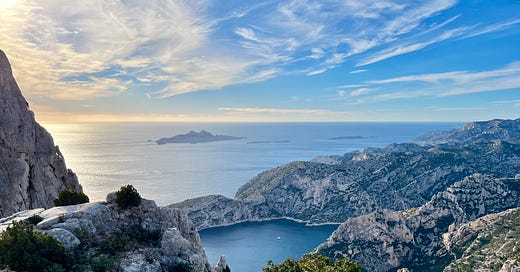


Hi Claudia,
Thanks for sharing and inspiring. Here are my terse answers to your questions, if interested I will be happy to expand:
1. What should we call the post-democratic paradigm?
I believe that thinking about democracy as means, not as an end, helps clarify things.
I contend that democracy is just means for achieving (political) equality, and should be evaluated, measured, praised, condemned, and revised based on how well it does achieve this goal.
Clearly, representative democracy in most western countries is failing miserably, where money easily buys political power and hampers political equality, having a detrimental effect also on economic equality. But Switzerland could be a good example to the contrary, where citizens and not money is still in power. As an anecdote, the amount of a speeding ticker in Switzerland is correlated with one's annual income, so a 1M CHF speeding ticket is possible (current record is around CHF 300,000).
So, no need to fix the name 'democracy', but there is a clear need to fix many dysfunctional democracies :)
2. Who decides who decides?
Political equality means much more than 1 person - 1 vote.
The work of my team at Weizmann and colleagues for the past several years tried to address many aspects of equality in democratic decision making processes, including:
- equality in constitution formation and amendment: https://arxiv.org/abs/2011.03111
- equality in making the proposals to vote upon: https://arxiv.org/abs/1806.06277
- equality in coalition formation: https://arxiv.org/abs/2001.08031
- equality in choosing ministers for the executive branch: https://arxiv.org/abs/2009.09734
- and even equality in deciding to fork: https://arxiv.org/abs/2103.03652
3. Proposition for an entirely new governing system in a post-conflict time of peace?
I am working with colleagues (Procaccia, Halperin, Talmon) on "Grassroots Sortition of Federated Assemblies for Scalable Egalitarian Governance". Will be happy share this when we are done.
4. How do we shift decision-making power to Citizens’ Assemblies? And what does accountability and legitimacy entail if Citizens’ Assemblies have binding decision making authority?
I think our grassroots approach offers a path for legitimacy, since with it all citizens are/can be members of assemblies. So it can become a mass movement, which could eventually receive the requisite authority.
5. Should participation in Citizens’ Assemblies be compulsory in the same way as jury duty?
With our approach, everyone (who wants to have a say) is a member of one or many assemblies that protect and advance their political goals and interests. As members of higher assemblies are selected by sortition from lower assemblies, if any individual wishes not to serve (also) in a higher-level assembly, many peers should be available as a substitute.
6. When carrying out sortition processes, how should we decide which quotas are appropriate, fair, and legitimate?
This is the key question grassroots sortition tries to answer: People voluntarily form and joins assemblies that address their identity, issues, and goals. A personal can be a member of multiple such assemblies (my neighborhood, my religion, my gender, my environmental/economic/other agendas), and the mathematics of grassroots sortition aims to reflect peoples interests in a correct way without external quotas or intervention, only based on the structure and size of the grassroots communities/assemblies they form.
7. How should we ‘scale’ public deliberation?
Grassroots citizens assemblies offer a clear path to scalability. Questions are deliberated at all levels, and a representative of a lower assembly carries the knowhow, ideas and opinions of their lower assembly to the deliberation at the higher assembly. The process can be interactive, in that questions and approaches discussed at the higher assembly can be brought down for deliberation at the lower assembly by such a representative, only to have the results percolate back up to the higher assembly.
8. Should we use the word ‘citizen’?
Eventually, we should have a notion of a 'global citizens', to which every human being is entitled. This is a long discussion:)
9. How could we transition towards an elections system without political parties?
Grassroots federated assemblies offer a path to achieve that goal, I believe.
10. How do we bring in the more-than-human world into our conception of the next governance paradigm?
I am sorry if I repeat myself, but I think grassroots federated assemblies offer a path to achieve that goal too, as follows.
If there are people who care about animal rights, about biodiversity, about climate change, etc., all they have to do is form assemblies that address these interests. They will be represented at the various level of the hierarchical citizens assembly according to their relative sizes.
The more people who care about these issues, the stronger their political power will be.
11. How are rapid advances in AI and other new technologies impacting how we should think about agency accountability, authority, responsibility?
I think this is a huge question, and is closely tied to inequality: AI is controlled by big corporations and serves their interests and thus will help tilt the scale against ordinary people and in favor of money. Citizens must defend themselves against this, and vehemently. The more power we have to the people, and the sooner we have it, the better we can protect against further increase of political and economic inequality caused by AI.
Its important to recognize that "AI" is not neutral - it can be trained, and the trainer has ample and subtle control of its behavior, which is very difficult to discern just by observing the actual behavior of AI. The issues are similar to those of the "algorithms" of social networks, but are much more profound and grave and require knowledgable and responsible governance and regulation.
12. What does leadership look like in a new governance paradigm?
My preferred leadership model is Switzerland, with the unfailing question that no one can answer:
Name a Swiss leader since William Tell (circa 1307)?
Nobody knows. And Switzerland has managed quite well for the last 700 years or so without any memorable leaders. And with a solid democracy. That's the answer. If you have strong citizens participation, they don't need strong leaders, only servants of the public will.
(Yes, I know it took them forever to give woman voting rights; that's another discussion).
I always enjoy following where your brain is going, and am looking forward to speaking soon. For what it's worth, though, I don't feel like I can go with you on the central idea that we need to go "beyond democracy" - just as I don't think we can or should abandon the word "citizen" - and in all honesty it worries me a little. For me (and I think you know this!), it's more about moving the qualifying adjective to the existing system... so for example I think we need to start insisting on calling what we have today "Consumer Democracy" rather than abandoning the frame of democracy entirely. Established language and frames don't die because you refuse to use them, they just get more easily occupied by those who would reduce them to exclusionary concepts. My view is that a big part of 2024 is going to be about fighting for ownership of critical language, and I'd hate to lose you as an ally in that work... As ever, though, I look forward to the debate!